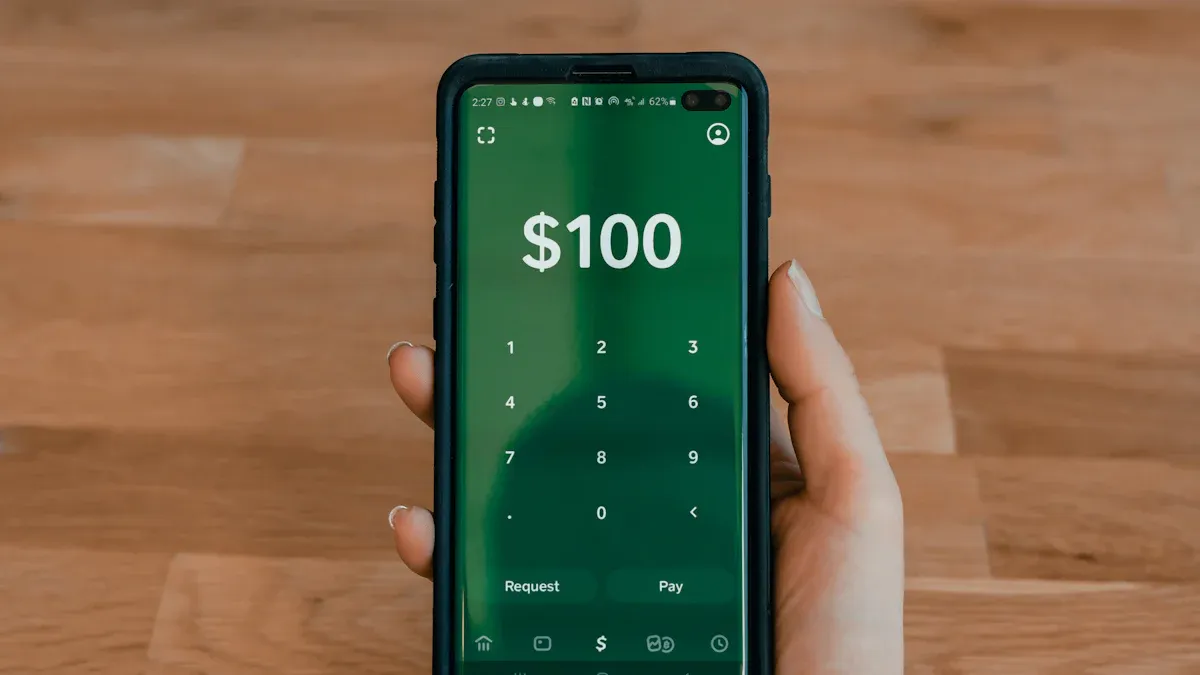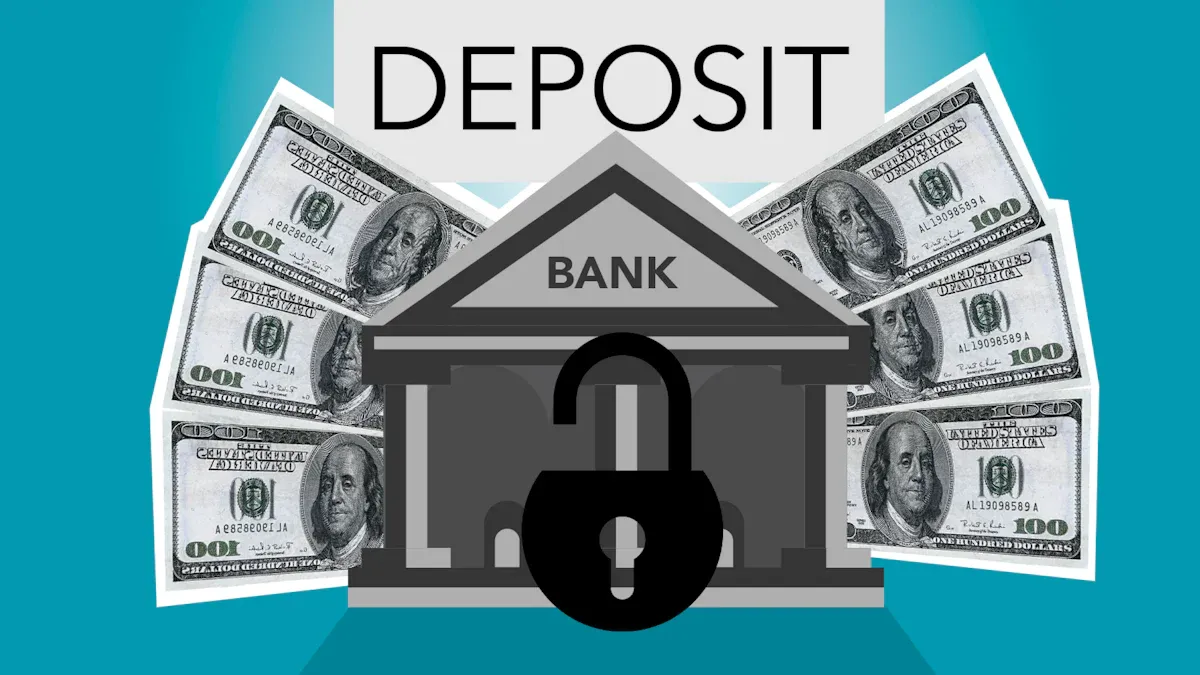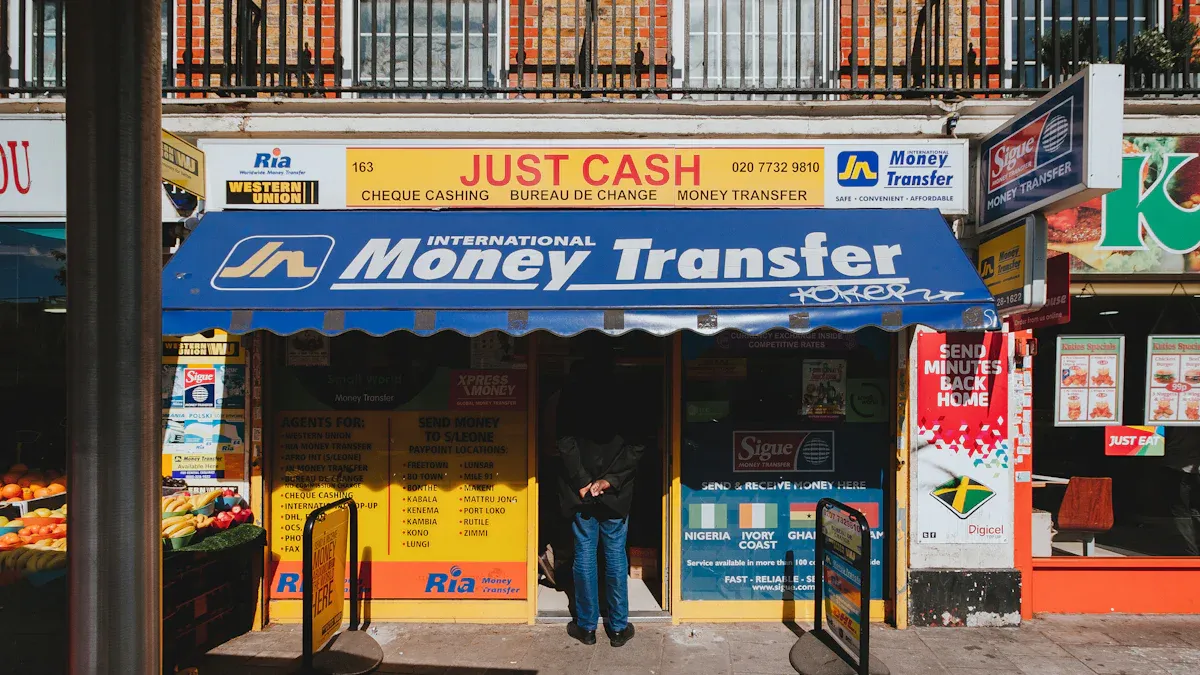- EasyCard
- Trade
- Help
- Announcement
- Academy
- SWIFT Code
- Iban Number
- Referral
- Customer Service
- Blog
- Creator
Is Sendwave the safest way to send money abroad

Image Source: unsplash
You want to send money overseas safely and quickly. Sendwave safety ranks high because users care most about secure transfers. People like you look for providers that use encryption, offer two-factor authentication, and follow strict data protection rules. You also value clear fees, strong fraud prevention, and reliable customer support. Trust and reliability matter most when choosing a money transfer service. Sendwave addresses these needs, making it a strong option for secure international transfers.
Key Takeaways
- Sendwave uses strong security like 256-bit encryption and two-factor authentication to protect your money and personal data.
- You must verify your identity with official documents to keep your account safe and avoid delays in sending money.
- Sendwave watches for fraud and alerts you about suspicious activity, but you should also keep your passwords private and be alert to scams.
- Transfers usually complete in minutes, and customer support is available 24/7 to help with any concerns.
- Always double-check recipient details, keep your app updated, and avoid public Wi-Fi to ensure safe and smooth money transfers.
Is Sendwave Safe?

Image Source: pexels
Sendwave Safety Overview
You want to know, is Sendwave safe for your money and information? Sendwave safety stands out because the company uses strong security protocols to protect you. When you use Sendwave, your sensitive data gets encrypted right away. The platform uses 256-bit encryption, which is the same level that banks use. You also get SMS-based two-factor authentication. This means you need a unique code sent to your phone every time you log in. This extra step helps keep your account secure.
Sendwave safety also includes identity verification when you set up your account. This process checks that you are the real owner and helps block fake accounts. The company monitors transactions for suspicious activity. If Sendwave notices anything unusual, you get an alert. You can also contact customer support at any time if you have concerns about your account.
Here is a table that shows the main security features you get with Sendwave:
| Security Protocol | Description |
|---|---|
| Account Verification | Only you can access your funds and transactions. |
| 256-bit Encryption | Protects your data as soon as you enter it and while it moves through the system. |
| Two-Factor Authentication | Requires a unique SMS code for each login to add another layer of security. |
| Identity Verification | Confirms your identity during account setup to stop fraud. |
| Fraud Monitoring | Watches for suspicious activity and sends you alerts if needed. |
| User Recommendations | Reminds you to use strong passwords and enable two-factor authentication. |
| Customer Support | Offers help 24/7 if you notice anything strange or need advice. |
You may wonder, is Sendwave safe compared to other services? The company also follows strict rules set by financial regulators. Sendwave is registered as a Money Services Business with FinCEN in the United States. It is authorized by the FCA in the United Kingdom, FINTRAC in Canada, and the NBB in the European Union. Sendwave safety includes regular audits by these regulators and independent reviewers. The mobile app has PCI DSS certification, which means it meets high standards for payment data security. Sendwave also follows GDPR rules to protect your personal information.
Security Reputation
You might ask, is Sendwave safe based on its track record? Over the past five years, Sendwave has not reported any direct security breaches. Some users have faced scams, but these incidents happened because of outside fraudsters, not because Sendwave safety failed. The company stresses that you must keep your account details private and watch out for scams. Sendwave monitors transactions and uses fraud prevention tools, but it also reminds you that you play a key role in keeping your account safe.
You can feel confident using Sendwave because the company has not admitted to any security incidents or breaches. Sendwave safety relies on both strong technology and your careful actions. If you ever notice something suspicious, you can reach out to customer support at any time.
Tip: Always use a strong, unique password and enable two-factor authentication to boost your account security.
When you send money with Sendwave, your transfer usually completes in 2 to 5 minutes. Sometimes, it may take longer depending on the country or method, but most users find the process fast and reliable. This quick service, combined with strong security, helps answer the question: is Sendwave safe for your needs? Many users trust Sendwave safety for sending money abroad, and the company’s reputation supports this trust.
What Is Sendwave?

Image Source: unsplash
How Sendwave Works
Sendwave started in 2014. Drew Durbin and Lincoln Quirk wanted to make sending money easier and cheaper. They focused on helping people send money to Africa. They built a mobile-first app that lets you send money right from your phone. This approach skips the need for agents or cash pickup locations.
Here is a quick look at Sendwave’s journey:
| Year | Event |
|---|---|
| 2014 | Sendwave founded to simplify and lower the cost of international transfers. |
| 2014-2019 | Expanded across Africa, using mobile money accounts for fast delivery. |
| 2020 | Acquired by WorldRemit, forming the parent company Zepz. |
| 2021+ | Grew to handle over $10 billion in annual transfers and expanded into Asia. |
You can use Sendwave as your money transfer solution by following these steps:
- Download the Sendwave app from Google Play or the Apple Store.
- Sign up with your name, email, and phone number.
- Link your debit card.
- Enter your recipient’s details.
- Choose the amount to send.
- Review and confirm your transfer.
The app sends money directly to your recipient’s mobile wallet or bank account. Most transfers finish in minutes.
User Experience
You may find Sendwave easy to use, but some users report issues. Sometimes, Sendwave cancels transactions during security checks. You might see delays or need to provide more information. These steps help keep your money safe, but they can slow things down.
Some users say customer support is hard to reach or slow to respond. If you have trouble, you can try removing recipients, updating your debit card, or reinstalling the app. Sendwave’s FAQ gives tips for fixing common problems.
Note: Sendwave uses strict checks to protect your money. If your transfer is delayed or cancelled, it is usually for safety reasons.
Many people trust Sendwave for fast, secure transfers. The company keeps improving its app and support to make your experience better.
Sendwave Safety Features
Encryption and Data Protection
You want your personal and financial information to stay safe. Sendwave uses 128-bit encryption to protect your data during every transfer. This level of encryption keeps your debit card details and personal information secure from hackers. Sendwave also follows strict data protection rules. The company complies with the General Data Protection Regulation (GDPR) and the Belgian Data Protection Law. These laws require Sendwave to handle your data with care and give you rights over your information. Regular audits help make sure that Sendwave safety standards stay high.
Regulatory Compliance
You can trust Sendwave because it meets important legal standards. The company operates under the rules of the EU GDPR and follows the Belgian Data Protection Law. Sendwave’s privacy policy explains how your data is collected, stored, and used. You have the right to access and correct your information. The company also provides contact details for its Data Protection Officer. This transparency shows that Sendwave safety is not just a promise but a legal requirement.
Identity Verification
Sendwave checks your identity before you send money. You must upload official documents, such as a driver’s license, passport, or visa. Sometimes, you need to provide a recent bank statement that matches your name and address. You upload these documents through the app. The process usually takes one to two business days. If you do not provide clear documents, your account may get suspended. Always respond quickly to requests for more information to keep your account active.
- Required documents for verification:
- Official ID (driver’s license, passport, or visa)
- Recent bank statement with your name and address
Fraud Prevention
Sendwave works hard to stop fraud. The company uses technology to watch for suspicious activity in real time. It checks registrations, transactions, and logins for signs of fraud. If Sendwave suspects illegal activity, it can suspend your account or stop a transaction. The company also shares information with crime prevention agencies to help fight fraud and money laundering. You get tips on how to spot phishing scams and are encouraged to report anything suspicious. This active approach helps keep your money safe and supports sendwave safety.
Tip: Always check messages for signs of scams and never share your login details with anyone.
Pros and Cons
Safety Advantages
You get strong security when you use Sendwave. The service uses 256-bit encryption and two-factor authentication to protect your money and information. These features help block unauthorized access and reduce the risk of fraud. Sendwave follows strict rules in every country where it operates. The company holds licenses and meets all legal requirements for money transfers. This focus on consumer financial protection means your funds stay safe and your privacy is respected.
Sendwave does not store your personal data. Instead, it uses industry-standard encryption for every transaction. This approach lowers the risk of phishing scams and keeps your details private. You also benefit from 24/7 multilingual customer support. If you have questions or concerns, you can reach out at any time. Compared to traditional banks, Sendwave offers faster transfers and better privacy. You do not need to worry about your information being kept longer than necessary.
Note: Sendwave’s commitment to consumer financial protection and privacy makes it a trusted choice for many users.
Drawbacks and Risks
You should know about some risks before you use Sendwave. The Consumer Financial Protection Bureau (CFPB) took action against Chime, the company behind Sendwave. The CFPB found that Chime misled users about transfer speed and cost. The company also forced users to give up legal rights, failed to provide clear receipts, and did not investigate remittance transfer errors properly. As a result, Chime had to refund $1.5 million in fees and pay a penalty.
You may face other challenges, too:
- You must complete identity verification, which can delay your first transfer.
- Extra fees may apply, such as currency conversion charges.
- Your recipient might pay withdrawal fees at banks or ATMs.
- Customer service sometimes responds slowly or does not resolve issues quickly.
- Sendwave’s terms may limit your rights if problems occur.
Tip: Always review the terms and keep records of your transfers. This helps protect your consumer financial protection rights.
Sendwave vs. Other Services
Wise
You may know Wise as a popular choice for international money transfers. Wise uses HTTPS encryption and two-factor authentication to protect your account. The company operates under strict regulations in many countries. Wise also promises to keep your personal data safe. You can see how Sendwave and Wise compare in the table below:
| Feature | Sendwave | Wise |
|---|---|---|
| Licensing | Licensed by New York Department of Financial Services | Strictly regulated in multiple countries |
| Encryption | Industry-standard 256-bit encryption | HTTPS encryption |
| Authentication | Two-factor authentication | Two-factor authentication |
| Data Protection Commitment | Not explicitly stated beyond encryption/authentication | Explicit commitment to keeping personal data safe |
Both services use strong security, but Wise gives you more details about how it protects your data.
Western Union
Western Union has a long history in the money transfer business. You can send money to many countries using their network. Western Union uses encryption and follows strict rules set by financial authorities. The company checks your identity and monitors transactions for fraud. You may find Western Union’s customer support helpful, but some users report slow responses. Western Union’s remittance services agreement explains your rights and responsibilities.
Remitly
Remitly focuses on fast and secure transfers. The company uses encryption and two-factor authentication. Remitly checks your identity before you send money. The company also follows strict rules in every country where it operates. Remitly’s remittance services agreement gives you information about fees, limits, and your protection as a user.
Safety Comparison
You want to know how Sendwave compares to these services. Sendwave uses strong encryption and works with financial institutions to meet international money transfer rules. The company has a strong commitment to security. Many users trust Sendwave, and customer reviews rate it highly for reliability and secure handling of transfers. You may find Sendwave’s customer service effective, but some users report limits on transfer amounts and country availability.
Note: Each service offers strong safety features, but you should always read the remittance services agreement before you send money. This helps you understand your rights and the protection each company provides.
Sendwave Safety Tips
Best Practices
You can keep your money safe by following a few simple steps when using Sendwave. Always verify your identity with a valid ID and a unique security code when you open your account. This helps protect your funds and personal information. Sendwave holds your money in a special account during transfer delays, so your funds stay protected even if the company faces problems. However, if you live in the UK, remember that Sendwave is not a registered bank. Your money does not have FSCS depositor protection, so refunds may take longer and could be less than the original amount if fees apply.
You should enable two-factor authentication in the app. This adds another layer of security to your account. Protect your data by keeping your passwords and transaction history private. Always use strong, unique passwords. Monitor your account for any signs of unauthorized use. If you notice anything strange, contact customer service right away. Sendwave offers 24/7 support through the app or by email, so help is always available.
Here are some best practices to follow:
- Double-check the recipient’s name, phone number, and other details before sending money.
- Keep your app updated to get the latest security features.
- Avoid using public Wi-Fi when making transfers. Use your mobile data or a secure network.
- Set up transaction alerts to track your account activity.
Avoiding Scams
Scammers often target people who use money transfer apps. You should stay alert to common tricks. Some scammers pretend to be friends or family in trouble and ask for urgent money. Others promise loans or jobs but ask for fees upfront. Some scams involve fake checks or offers to become a secret shopper. You may also see messages about large sums of money from strangers, often called Nigerian fund-transfer scams.
To avoid these scams, always verify the identity of anyone who asks for money. Only send money to people you trust. Double-check all transaction details before confirming. Never share your account information or security codes with anyone. If someone asks you to send a small amount using a referral code and promises a refund, do not trust them. This is a common scam.
If you suspect fraud, report it to Sendwave, your bank, and the Federal Trade Commission. Change your passwords and watch your accounts closely. Use only official customer service contacts and never share sensitive information over unsolicited calls. By following these tips, you can help keep your money and information safe when using Sendwave.
You get strong security with Sendwave, including 256-bit encryption, two-factor authentication, and 24/7 support. Financial experts praise Sendwave for reliability, fast transfers, and user-friendly design. However, you should know that Sendwave is not the only safe option. Wise and other services also offer strong protection.
- Sendwave works well for many users, but you should compare features and limits with other providers.
- Always use two-factor authentication, check recipient details, and keep your app updated for safer transfers.
FAQ
How fast does Sendwave transfer money?
You usually see your money arrive within 2 to 5 minutes. Some transfers may take longer if extra checks are needed. Always check the app for updates on your transfer status.
Does Sendwave charge hidden fees?
Sendwave shows you all fees before you send money. You pay only what you see in the app. Exchange rates update in real time. You can check the latest USD exchange rates here.
Can you use Sendwave with Hong Kong banks?
Yes, you can send money to recipients with Hong Kong bank accounts. Make sure you enter the correct account details. The app will guide you through each step.
What should you do if you spot a suspicious transaction?
Contact Sendwave support right away. You can use the app or email for help. Change your password and review your recent transfers. Quick action helps protect your account.
Is your personal information safe with Sendwave?
Sendwave uses 256-bit encryption and follows strict data protection laws. Your information stays secure during every transfer. The company also completes regular audits to keep your data safe.
Security is only part of the equation when sending money abroad — cost, speed, and reach matter just as much. While Sendwave highlights safety, BiyaPay takes it further by combining secure transfers with real-time exchange rates, multi-currency conversion, and a transparent 0.5% remittance fee. You can send money to most countries worldwide, and funds arrive with same-day exchange and same-day delivery. That means your payments are not only protected, but also faster and more affordable.
Choose a solution built for global efficiency: register with BiyaPay and experience safe, low-cost, same-day international transfers.
*This article is provided for general information purposes and does not constitute legal, tax or other professional advice from BiyaPay or its subsidiaries and its affiliates, and it is not intended as a substitute for obtaining advice from a financial advisor or any other professional.
We make no representations, warranties or warranties, express or implied, as to the accuracy, completeness or timeliness of the contents of this publication.




Contact Us
Company and Team
BiyaPay Products
Customer Services
is a broker-dealer registered with the U.S. Securities and Exchange Commission (SEC) (No.: 802-127417), member of the Financial Industry Regulatory Authority (FINRA) (CRD: 325027), member of the Securities Investor Protection Corporation (SIPC), and regulated by FINRA and SEC.
registered with the US Financial Crimes Enforcement Network (FinCEN), as a Money Services Business (MSB), registration number: 31000218637349, and regulated by FinCEN.
registered as Financial Service Provider (FSP number: FSP1007221) in New Zealand, and is a member of the Financial Dispute Resolution Scheme, a New Zealand independent dispute resolution service provider.




















